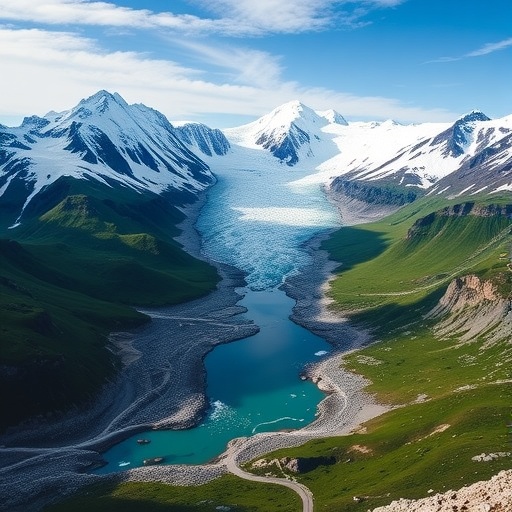Recent research has illuminated a critical aspect of our changing environment: the influence of glacial meltwater on coastal carbon dioxide uptake. As melting glaciers pour freshwater into the oceans, unprecedented biogeochemical dynamics are set into motion. Investigating the consequences of this phenomenon, scientists Henson, Puts, and Sejr have unveiled the intricate relationship between glacial melt and carbon dioxide levels in marine ecosystems, emphasizing the importance of understanding these shifts in a rapidly warming world.
The relationship between glacial meltwater and coastal carbon dioxide uptake is complex and multifaceted. Traditionally, coastal zones have acted as significant carbon sinks, absorbing substantial amounts of carbon dioxide from the atmosphere. However, the introduction of glacial meltwater alters this delicate balance. Freshwater influx changes the salinity and temperature of coastal waters, which in turn affects biological processes and the organisms that inhabit these areas. This study highlights how these changes can lead to a heightened sensitivity to biogeochemical shifts, revealing the pressing need for further investigation into these interactions.
As glaciers continue to shrink due to climate change, the implications for marine ecosystems become increasingly urgent. The research indicates that as glacial meltwater contributes to rising sea levels, it simultaneously boosts the carbon dioxide absorption capacity of coastal areas. This dual effect underscores the critical role that melting glaciers play in influencing global carbon cycles. Therefore, understanding these dynamics is essential for predicting future changes in both coastal ecosystems and the climate at large.
Moreover, the new findings suggest a troubling trend: while glacial meltwater enhances carbon uptake in the short term, it may also lead to long-term instability in coastal biogeochemical processes. The infusion of freshwater can bolster certain algal blooms, potentially disrupting existing food webs. These shifts could result in unforeseen consequences for fish populations and other marine life that depend on stable conditions. This predictive aspect speaks to the need for comprehensive modeling efforts that can account for the myriad variables involved in these ecosystems.
The implications of this research extend beyond simple atmospheric carbon dioxide absorption. By enhancing carbon uptake, glacial meltwater could inadvertently accelerate ocean acidification, a process that threatens marine biodiversity. Lower pH levels can hinder the growth of shellfish and coral, which are vital components of coastal ecosystems. Societies reliant on these resources for economic and nutritional stability may find themselves increasingly vulnerable to the repercussions of this enhanced sensitivity.
Additionally, this study highlights the necessity of interdisciplinary approaches in environmental science. The interplay between glacial dynamics, ocean currents, and atmospheric conditions demonstrates that insights from fields such as geology, oceanography, and climate science must converge to provide a comprehensive understanding of these complex interactions. Researchers call for collaborative efforts to effectively address these pressing environmental issues.
Furthermore, a growing body of evidence indicates that the impacts of glacial meltwater on carbon dynamics are exacerbated by anthropogenic factors. Human activities, including fossil fuel burning and land-use changes, add additional layers of complexity to natural processes. The interaction between natural and anthropogenic factors may produce unpredictable outcomes, amplifying existing stresses on marine ecosystems and challenging current conservation strategies.
As we look to the future, the urgency of this research cannot be overstated. Policymakers and environmental organizations must take heed of the findings, as they outline critical pathways for mitigating climate impacts. Effective management strategies aimed at preserving glacial environments and coastal ecosystems will be vital. This will require adaptive governance models that incorporate scientific data and prioritize resilience in the face of constant change.
The researchers stress that public awareness and education are also pivotal components of addressing these shifts. Engaging communities in discussions about climate change and its far-reaching effects can foster greater understanding and advocacy for sustainable practices. As glaciers continue to retreat, it is imperative that individuals comprehend the broader implications of these transformations that reach far beyond the ice.
Moreover, this research can be a catalyst for future studies aimed at unraveling the complexities of climate change mechanisms. The relationships pieced together through this investigation may lay the groundwork for subsequent inquiries into other environmental factors driven by global warming. A robust science agenda that explores these linkages can help improve predictive models, ultimately informing better policy decisions.
In conclusion, the convergence of glacial meltwater and coastal carbon dioxide uptake presents a stark reminder of the interconnectivity of our planet’s systems. The findings from Henson, Puts, and Sejr illuminate critical pathways for understanding how human-induced climate change is altering natural processes. As scientists continue to peel back the layers of these complex interactions, it becomes increasingly clear that our approaches to climate change must be informed by rigorous research and a commitment to sustainability.
This study serves as a clarion call for the scientific community, policymakers, and the public alike. We must act urgently to mitigate the impacts of climate change, protect the integrity of our oceans, and understand the ramifications of our changing planet. The research illustrates not just the challenges, but also the opportunities to better equip ourselves for a rapidly evolving environmental landscape.
Subject of Research: Coastal carbon dioxide uptake and glacial meltwater effects.
Article Title: Glacial meltwater increases coastal carbon dioxide uptake and sensitivity to biogeochemical change.
Article References:
Henson, H.C., Puts, I.C., Sejr, M.K. et al. Glacial meltwater increases coastal carbon dioxide uptake and sensitivity to biogeochemical change.
Commun Earth Environ 6, 687 (2025). https://doi.org/10.1038/s43247-025-02685-4
Image Credits: AI Generated
DOI: 10.1038/s43247-025-02685-4
Keywords: glacial meltwater, coastal ecosystems, carbon dioxide uptake, biogeochemical change, climate change.




